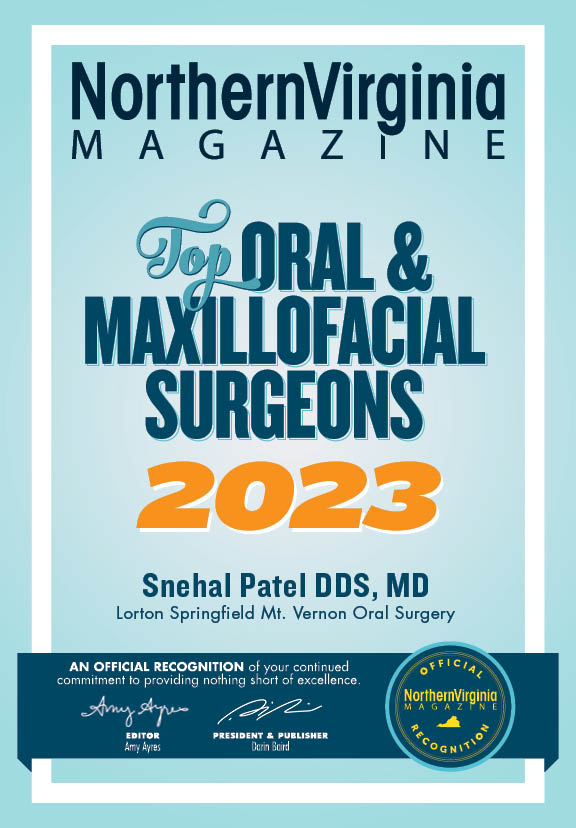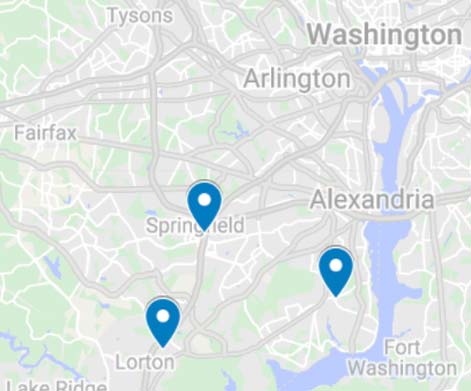Ridge Procedures in Northern VA
Ridge Augmentation
A ridge augmentation is a common ridge procedure often performed following a tooth extraction to help recreate the natural contour of the gums and jaw that may have been lost due to bone loss as a result of a tooth extraction, or for another reason.
The alveolar ridge of the jaw is the bone that surrounds the roots of teeth. When a tooth is removed, an empty socket is left in the alveolar ridge bone. Usually this empty socket will heal on its own, filling with bone and tissue. Sometimes when a tooth is removed, the bone surrounding the socket breaks, and it unable to heal on its own. The previous height and width of the socket will continue to deteriorate.
Rebuilding the original height and width of the alveolar ridge is not medically necessary, but may be required for dental implant placement, or for aesthetic purposes. Dental implants require bone to support their structure, and a ridge augmentation can help rebuild this bone to accommodate the implant.
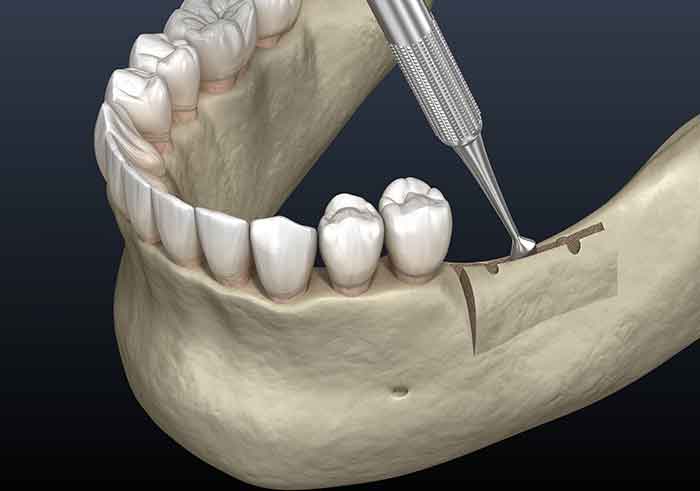
Illustration shows cleavage of the alveolar ridge, augmentation. Dental surgery, 3D illustration.
How is the Oral Surgery Accomplished?
A ridge augmentation is accomplished by placing bone graft material in the tooth socket. It is often done immediately after the tooth is removed, to avoid the need for a second procedure later. Next, the gum tissue is placed over the socket and secured with sutures. Dr. Patel may choose to use a space-maintaining product over the top of the graft to help restore the height and width of the space created by the tooth and bone loss, and into which new bone should grow. Once the socket has healed, the alveolar ridge can be prepared for dental implant placement.
A ridge augmentation procedure is typically performed in Dr. Patel’s office under local anesthesia. Some patients may also request sedative medication in addition.
Ridge Modification
Ridge modification is an effective procedure for treating deformities in the upper and lower jaws. These deformities can occur as a result of periodontal disease, trauma, injury, wearing dentures, or developmental problems. Such defects can leave insufficient bone for the placement of dental implants and an additional unattractive indentation in the jaw line adjacent to the missing teeth.
During the ridge modification procedure, the gum is lifted away from the ridge to fully expose the defect in the bone. The bony defect can be filled with bone graft material that can help regenerate lost bone or a bone substitute. Finally, the incision is closed and several months of healing will be required. Depending on the case and type of implant and procedure, the dental implant might be placed during the ridge modification procedure or when healing is complete; this all depends on the condition of the bone. Ridge modification improves the cosmetic appearance, functionality of the mouth, and the chance of enjoying dental implants for many years.
Ridge Preservation
Although it may be ideal to maintain your natural teeth for a lifetime, it’s not always a possibility. Trauma, disease, and poor oral hygiene can lead to one or more teeth falling out earlier than you might expect. Additional teeth may also need to be extracted if it means saving the health of the rest of your smile. However, it’s crucial to retain as much of your natural jawbone as possible.
At Lorton, Springfield & Mt Vernon Dental Implants & Oral Surgery, Dr. Patel uses a ridge preservation bone graft to maintain the strength of your jawbone. Once the bone graft has healed thoroughly, you can take the next steps toward permanently restoring your missing teeth.
Why Is Ridge Preservation Necessary?
Also known as socket preservation, ridge preservation allows you to receive dental implants. If your teeth have been missing for some time, it’s possible that your jawbone has begun to atrophy, which minimizes the chances of your implants being effective.
Before beginning your implant procedure, Dr. Patel will perform a ridge preservation bone graft that restores the jaw bone density in the socket. This pre-emptive procedure will allow you to receive dental implants if atrophy has occurred.
Ridge Preservation Treatment in Lorton, Springfield & Mt Vernon
During your appointment, Dr. Patel will examine your teeth and measure the density of your jawbone using CBCT and digital scanners. If your jawbone is too soft, he will suggest a bone graft to add volume to your jaw and create a custom treatment plan that details the extent of your implant surgery.
Once Dr. Patel extracts your tooth, he will pack the empty socket with a bone grafting material and cover it with sutures. After several months, new bone will begin to grow and replace the graft.
It’s essential that you receive dental implants after your jawbone has healed, as the graft will not permanently maintain the structure of your teeth. Typically, dental implants are placed four to twelve months after ridge preservation has taken place. It is also possible to perform bone grafting on the same day as an extraction to make the treatment process as efficient as possible.
Ridge preservation treatment will undoubtedly lengthen your treatment time for dental implants, but it will guarantee that your new teeth will be healthy and long-lasting.
Our oral surgeons have the experience and credentials you should look for when seeking oral surgery.
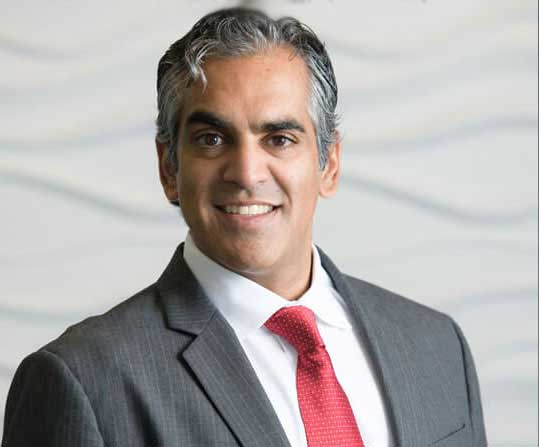
Dr. Patel is both a dentist and a physician, completing both his dental and medical degrees at Columbia University. Dr. Patel was also part of one of the first teams involved in CT guided dental implant placement at Columbia University.
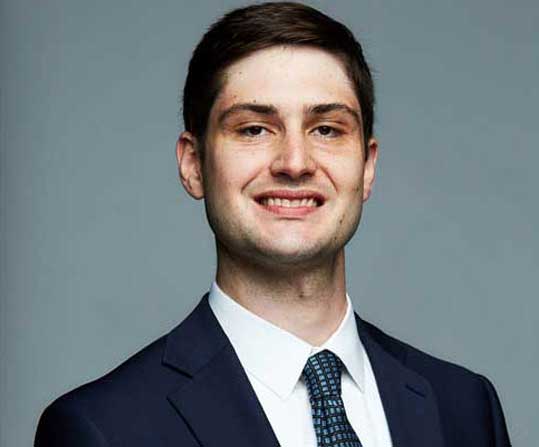
Dr. Jungwirth pursued his love of Oral and Maxillofacial Surgery by completing an internship and residency at the Rutgers School of Dental Medicine, a program known across the country for its superb clinical training.
Less than 1% of 704,000+ dentists worldwide are Board Certified Oral Surgeons who have earned ABOMS Diplomate credentials.
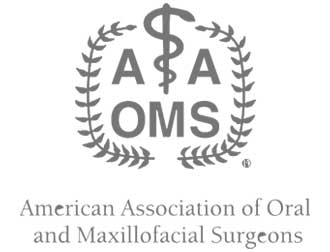
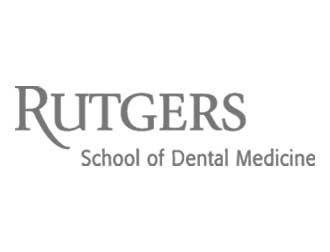
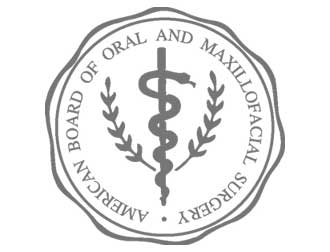
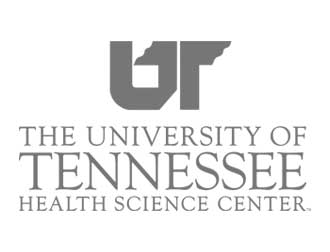
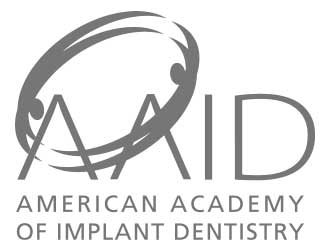
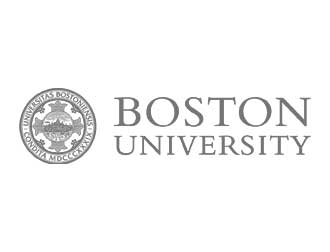
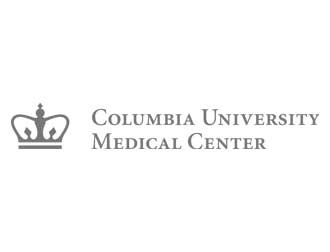
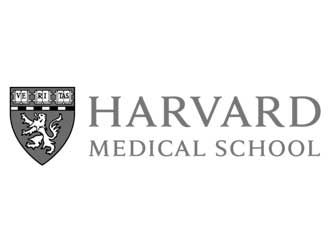
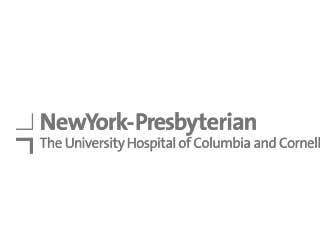
Dedicated to life-long learning, Dr. Patel and Dr. Jungwirth average up to 20x the amount of continuing education credit hours required by the State of Virginia per licensing period.
Oral Surgeons serving the Northern Virginia area with locations in Lorton, Springfield & Mt Vernon, Virginia.
Regular dental cleanings are an important part of maintaining a healthy smile. However, certain dental and facial conditions require more comprehensive care. Oral & maxillofacial surgery refers to a number of surgical dental procedures that treat a wide array of conditions that affect the head, neck, face, and jaw.
Lorton, Springfield & Mt Vernon Dental Implants & Oral Surgery are specialty dental offices in Northern Virginia that focus solely on providing oral and maxillofacial procedures. Our state-of-the-art offices are equipped to provide comprehensive dental surgery solutions for patients with diverse needs. From wisdom teeth extraction to dental implant placement, Lorton oral surgeon Dr. Snehal Patel is committed to helping patients gain healthy, fully functional smiles.
What are Common Oral Surgery Procedures?
While most patients are familiar with common procedures as wisdom teeth extraction, few are fully aware of the number of treatments that are considered oral surgery. Routine procedures, such as impacted/dead tooth removal, dental implant placement, and bone grafting are fairly common oral surgeries patients may encounter throughout their lifetime.
In addition to these common procedures, experienced oral surgeons may be called on for the following procedures:
Who can Perform Oral & Maxillofacial Surgeries?
While some general dentists may offer treatments such as tooth extraction, it is recommended that patients visit an experienced oral surgeon for all upcoming dental surgeries. In addition to general dental school, specialized oral surgeons must complete a minimum four year hospital-based surgical residency program followed by annual recertification. As a result, oral surgeons are highly trained, highly qualified specialists with a unique understanding of the face and mouth.
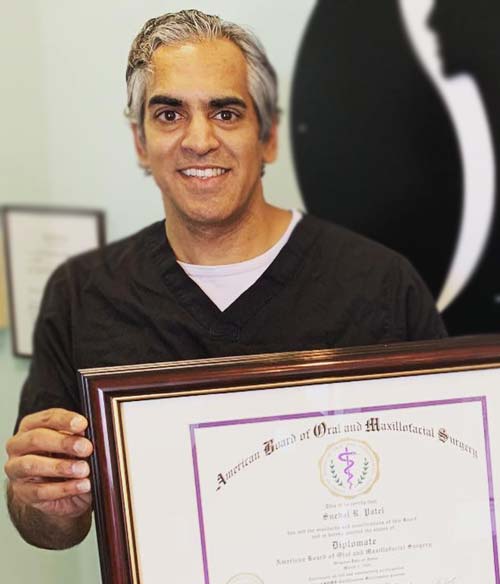
Snehal Patel, DDS
Dr. Patel is both a dentist and a physician, completing both his dental and medical degrees at Columbia University. He finished his residency in Oral & Maxillofacial Surgery at Columbia Presbyterian Medical Center in New York City. During his training, he participated with Healing the Children in the countries of Colombia and Ecuador treating children with cleft lips and palates. Dr. Patel was also part of one of the first teams involved in CT guided dental implant placement at Columbia University. Dr. Patel was born and raised in Philadelphia and went to Boston University for college. Dr. Patel and his wife enjoy spending time together and enjoy traveling.
Education
- Boston University
- Columbia University (DDS & MD)
- Columbia Presbyterian Medical Center
Memberships
- American Association of Oral & Maxillofacial Surgeons (AAOMS)
- American Academy of Implant Dentistry (AAID)
- Diplomate – American Board of Oral & Maxillofacial Surgery (ABOMS)
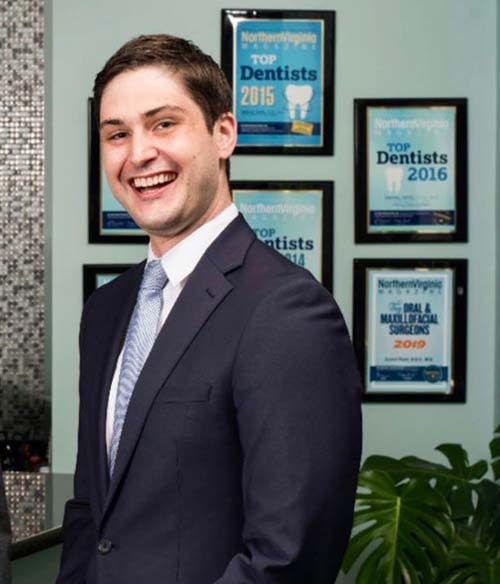
Michael Jungwirth, DMD
Dr. Michael Jungwirth was born in Worcester, Massachusetts and grew up in Keene, New Hampshire. He graduated first in his class at the University of Tennessee with a degree in neuroscience and associate research. During his undergraduate studies Dr. Jungwirth pursued his passion for the advancement of medical science by performing molecular and cellular biology research and publishing two manuscripts. He was also awarded a Goldwater Scholarship, a C.W. Fite Fellowship for Outstanding Professional Promise, and the William Harris III Undergraduate Research Award.
From there he attended the Harvard School of Dental Medicine, where he continued his passion for research and patient care. He received the Harvard Odontological Society Award for Excellence in Research, the Dr. Paul E. Boyle Award For Excellence in the Field of Oral Pathology, and several grants for his research on non-endothelial origin of midpalatal suture osteoblasts. Throughout his time at Harvard Dental School, Dr. Jungwirth made sure to give back to the community by serving as the treasurer for Operation Mouth Guard, an organization that provided mouth guards for underprivileged athletes. He also co-founded the Harvard School of Dental Medicine Introduction to Dentistry Course in order to inspire and guide the next generation of dental professionals.
Following his dental medicine training, Dr. Jungwirth pursued his love of Oral and Maxillofacial Surgery by completing an internship and residency at the Rutgers School of Dental Medicine, a program known across the country for its superb clinical training. He was honored to serve patients of all racial, socioeconomic, and ethnic backgrounds and make a difference in the community. He had the opportunity to serve as Chief Resident at University Hospital while training in Newark, New Jersey. He trained in full scope Oral and Maxillofacial Surgery including implants, dentoalveolar, pathology, cosmetics, trauma, and TMJ surgery.
Dr. Jungwirth is excited to serve Northern Virginia at Lorton, Springfield & Mt Vernon Dental Implant and Oral Surgery. In his spare time, he enjoys hanging out with his family and friends, hiking, skiing and travelling.
Education
- University of Tennessee Health Science Center
- Harvard School of Dental Medicine
- Rutgers School of Dental Medicine
Facing Oral Surgery? Call our Oral Surgeons Today!
While some oral surgeons only accept referrals from general dentists, Dr. Patel and his team welcome self-referred and referral patients. Regardless of the treatment you need, our oral surgeon will work closely with your general dentist to plan upcoming surgery and follow-up care. For more information about getting a referral or scheduling an appointment, contact us. We look forward to treating you!
OR CALL (703) 436-4633 OR TEXT US TO GET STARTED.

